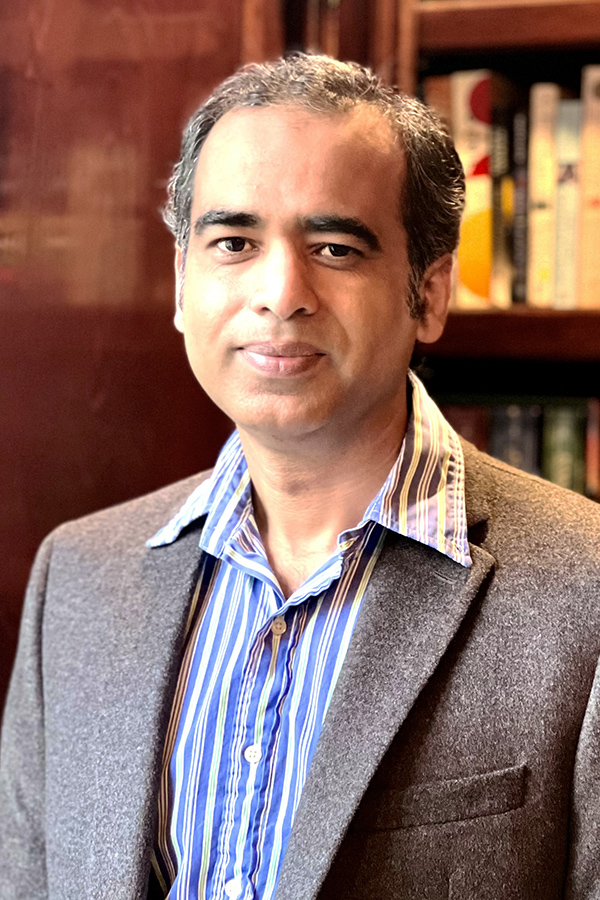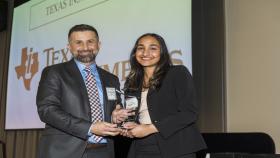Two Wallace H. Coulter Department of Biomedical Engineering faculty members have been recognized by their peers for their contributions to biomaterials research.
Julia Babensee has received the Clemson Award for Basic Research from the Society for Biomaterials and Ankur Singh the Mid-Career Award for 2022. Both will be honored at the society’s annual meeting later this spring and have the opportunity to make a presentation about their work.
Babensee has been involved with the society since she was a graduate student — and won awards for her research as a student and a young investigator — so her Clemson Award is especially meaningful.
“This is a significant honor for me,” said Babensee, associate professor in the Coulter Department. “I have always looked up to the winners of the Clemson Awards for their excellent research and contributions. I have always wanted to receive a Clemson Award, and I am very proud and happy to have done so.”
The Clemson Award for Basic Research recognizes contributions to knowledge and understanding of interactions between materials and organic tissues. Babensee is considered a pioneer in immunoengineering and host responses to biomaterials. She was among the first to study the interactions of biomaterials with key immune system cells called dendritic cells. She has demonstrated that dendritic cell characteristics can be manipulated by contact with different kinds of biomaterials, allowing researchers to create cells that can stimulate or suppress the immune system’s functions.
“Dr. Babensee’s outstanding contributions have significantly advanced thinking about how biomaterials can influence key cells of the immune cells and design strategies using biomaterials for immunomodulation,” according to nominator James M. Anderson, a professor of biomedical engineering and pathology at Case Western Reserve University.
Singh’s Mid-Career Award honors biomaterials researchers 10-20 years into their career who have demonstrated outstanding achievements. Singh, too, has been involved with the society since grad school and has previously been honored as a young investigator.
“This Mid-Career Award is special to me because it recognizes the collective years of my academic journey as an independent researcher, and it reflects the contributions and leadership my laboratory and I have demonstrated towards advancing the biomaterials field,” said Singh, associate professor in Coulter BME and Georgia Tech’s Woodruff School of Mechanical Engineering. “I am deeply honored. It has encouraged me to continue with creativity in the biomaterials field, focus on further training a cadre of young researchers, and encourage them towards taking game-changing high-risk, high-impact challenges that could shape science and society in the future.”
Singh’s research lab creates biomaterials-based immune tissues to mimic the structure and function of lymph nodes so they can study interactions between cells and cell decision-making. These models are tiny 3D tissue cultures grown from patient cells called organoids, or “on-chip” systems that draw inspiration from circuits on a microchip to create tiny channels and chambers on silicon wafers that recreate the flow and forces of tissues in the body.
“There are few biomaterials researchers or biomedical engineers in the world who can match the creativity of Ankur in the areas of immune-biomaterials and immune-engineering,” said nominator Kam W. Leong, a biomedical engineering professor at Columbia University, who also noted that Singh’s work can “significantly advance the understanding, diagnosis, or treatment of cancer and immune diseases.”
Latest BME News
Jo honored for his impact on science and mentorship
The department rises to the top in biomedical engineering programs for undergraduate education.
Commercialization program in Coulter BME announces project teams who will receive support to get their research to market.
Courses in the Wallace H. Coulter Department of Biomedical Engineering are being reformatted to incorporate AI and machine learning so students are prepared for a data-driven biotech sector.
Influenced by her mother's journey in engineering, Sriya Surapaneni hopes to inspire other young women in the field.
Coulter BME Professor Earns Tenure, Eyes Future of Innovation in Health and Medicine
The grant will fund the development of cutting-edge technology that could detect colorectal cancer through a simple breath test
The surgical support device landed Coulter BME its 4th consecutive win for the College of Engineering competition.









